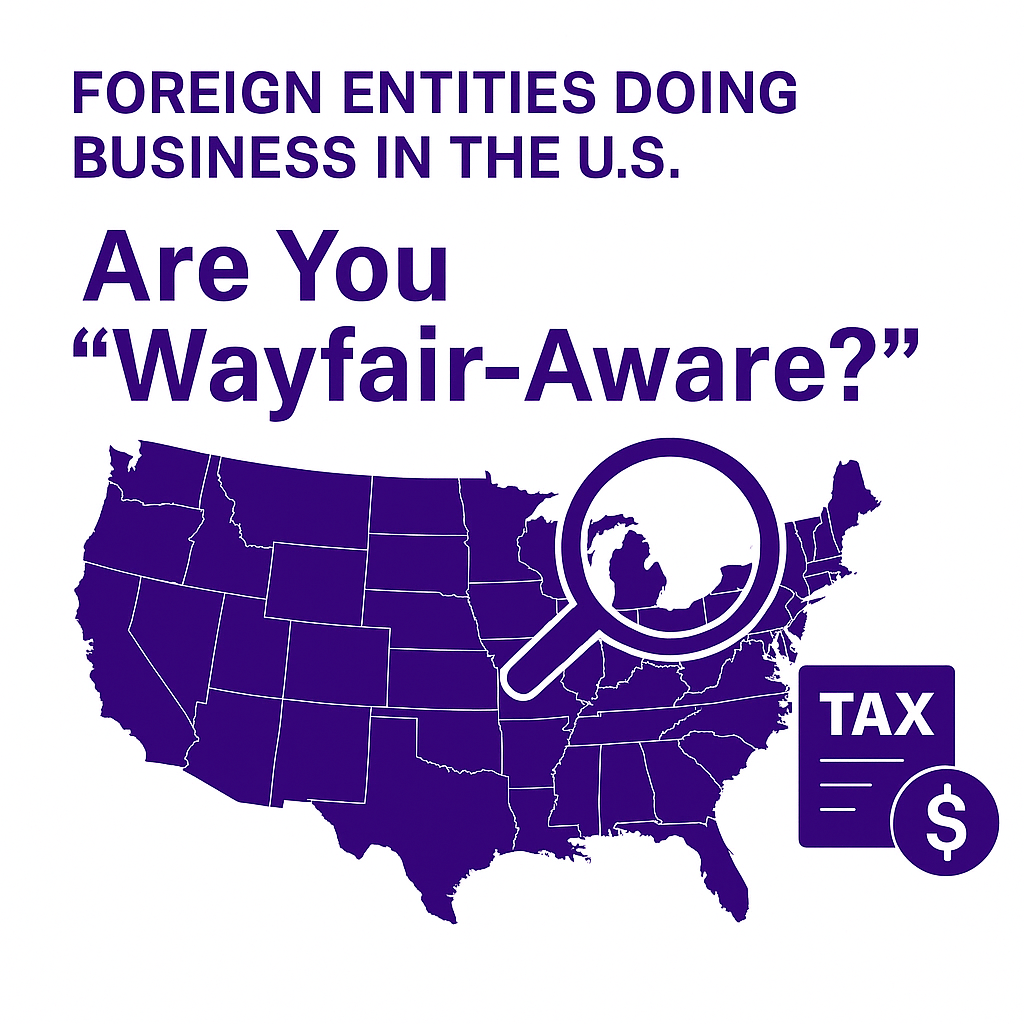
Foreign Entities Doing Business in the U.S. Are you “Wayfair-aware?”
Foreign direct investment (FDI) benefits the United States, principally by creating employment opportunities for U.S. residents. Foreign companies are drawn to the U.S. by its large trading markets, educated workforce and historically stable business environment. However, a trap for the unwary exists in the form of a disjointed and mostly-unaffiliated U.S. state and local tax regime. Over 10,000 distinct tax jurisdictions exist within the U.S., each looking for its “piece of the pie” in the form of income taxes, capital taxes, and/or transaction taxes (e.g. sales and use taxes).
It is reasonable for a company with physical presence in a location to expect to be subjected to the taxing powers of that jurisdiction, however, what some foreign companies may not know is that taxation without physical presence has become the norm at the state and local level in the U.S. In fact, change to the assertion of economic nexus to state and local taxing regimes (both income and indirect taxes) is occurring so rapidly that many U.S. domestic corporations are frequently faced with unexpected tax obligations.
A frequently heard statement from foreign companies is, “well, sales tax is no different from Value Added Tax (VAT) that we already deal with now.” It is, in fact, very different.
Dating back decades, a physical presence requirement was the determining factor in whether a taxpayer was subject to state sales tax collection obligations, because of the 1967 case, National Bellas Hess, Inc. v. Department of Revenue of Illinois and the 1992 case Quill Corp. v. North Dakota where the Supreme Court of the United States (SCOTUS) reaffirmed the physical presence requirement of Bellas Hess to prevent undue burdens on interstate commerce. Quill’s physical presence requirement stood until South Dakota v. Wayfair Inc. where SCOTUS overturned the decision of the South Dakota Supreme Court and found that the physical presence standard is “unsound and incorrect.”
What does all that mean to foreign companies selling into the U.S.? It is the end of the physical presence requirement and the imposition of an economic nexus tax regime. If you are responsible for tax filings for a foreign corporation with significant physical presence in the U.S. with a U.S.-based tax department, you are likely already “Wayfair-aware.” However, if you are responsible for the tax filings of (or advising) a foreign corporation with little or no U.S. physical presence and have not adopted a “Wayfair-aware” mentality, then consider this a wakeup call.
All U.S. states now have Wayfair-like laws on the books for sales tax. Also concerning is that failure to reach a threshold does not equal a “no filing requirement” because a state can still argue that substantial nexus exists.
Practitioners need to be Wayfair-aware in order to properly advise their clients. Particularly eye-opening is a case from North Carolina wherein a client sued its accounting firm for not advising the client about their responsibilities to collect sales tax from out-of-state customers. Can practitioners consider such a suit to be an outlier and expect that being sued by clients is an extreme and unlikely-to-occur-again practice? Given that Wayfair was decided in 2018 and states began adopting taxing regimes based on economic nexus principles shortly thereafter, the potential exposure for tax, interest and penalties could be enough to bankrupt a business, so future suits against advisors by their clients are more than likely. Of course, the more prudent course of action is for advisors to become proficient in seller tax responsibilities once they start doing business in the U.S.
